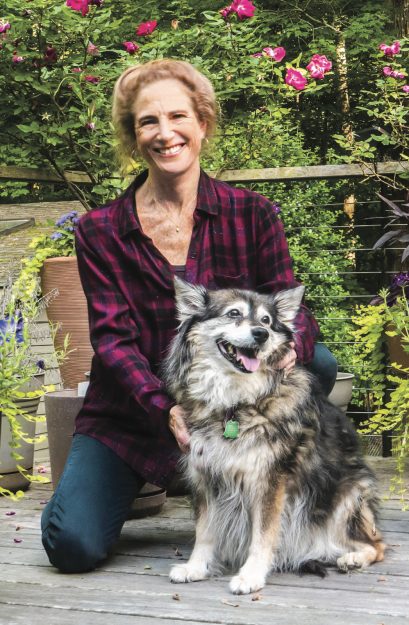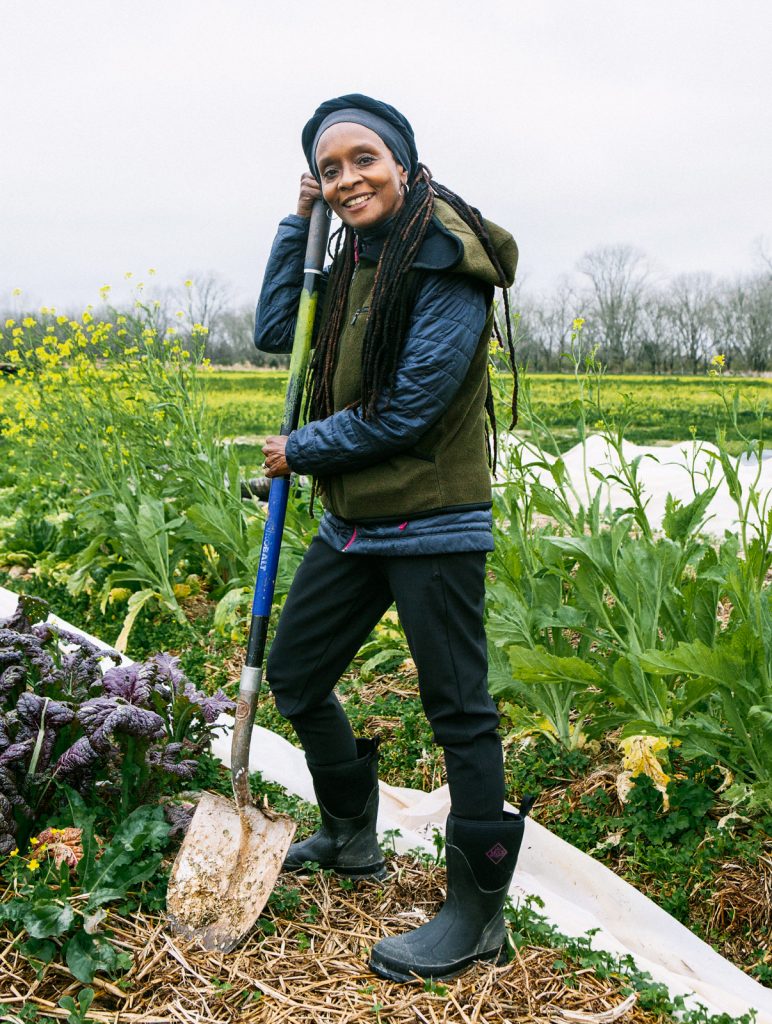The American meditation teachers Tara Brach and Konda Mason follow a vegan diet because of their concern for animals, health, and the environment. But the underlying problem linking these concerns is what Mason calls the myth of separation—that is, the distance we’ve placed and the false hierarchies we’ve created between ourselves and the planet, other species, and communities within our own species. If we focus instead on our interconnectedness, however, “it becomes harder to create harm,” Mason says. Brach and Mason spoke with Tricycle about why they feel plant-based eating is so crucial to the spiritual path.
What does “ethical eating” mean to you?
Tara Brach (TB): Ethical eating is eating that causes as little harm as possible to other beings, to the earth, and to our own bodies.
Konda Mason (KM): Involved in that is also education. Our culture hasn’t necessarily educated itself in respect to food and the impact our eating has on the earth. So I think it begins with us in the home, with bringing about a conscious awareness of that impact.
What personal experience impacted the way you see and respond to the suffering of nonhuman animals?
KM: When I was growing up, my grandparents and parents had a small farm with animals that we raised. I loved being on the farm with animals, and I had a very hard time because I saw the link immediately that the meat on my plate was this animal I had been in touch with. It created a groove in my heart, and once I left my parents’ house I became a vegan as soon as I could.
TB: I did not put the dots together until I was in college and started doing yoga and meditation and getting more attuned. I joined an ashram when I was 21 years old and became a vegetarian, but it was over the years that my visceral sensitivity to the suffering of animals grew. I remember as a young mom teaching at a meditation retreat near the Blue Ridge Mountains. Every day during our morning meditation we would hear mother cows lowing from nearby fields, grieving for calves that had just been taken from them. Like all mammals, they have a deep mother-child attachment. I would listen to these heart-wrenching calls and imagine how excruciating it was for these mother cows to have their babies taken away. It opened me in a very direct way, and I stopped eating dairy after that. I went fully vegan eight years ago, but I was mostly vegan for decades before that.
How do we get closer to the suffering when we’re so far removed from the process?
KM: It’s awareness. It’s hearing about and being exposed to other ways of eating. There are many reasons that people become vegan—not just the rejection of animal cruelty, which is how I got there. The African American community is almost three times more likely to be vegan and vegetarian than other Americans, and many do so for health reasons. Or maybe climate change and the meat industry’s huge impact on the environment is the door you walk through.
This conversation is intersectional. As for animal suffering, we have been anesthetized by violence in this country, which was actually built on violence; violence is part of what we drink, watch, and eat every day. We have numbed ourselves to the violence that is inflicted on animals. But there are many beautiful organizations that are doing the good work to bring awareness, and we just have to keep educating.
TB: The diversity of life forms brings beauty and health to our living earth. Yet the more we humans perceive difference, the more our conditioning to devalue others kicks in. This shuts down our compassion because we don’t register the realness of others’ suffering. Waking up our caring involves deepening our attention to the reality of others’ subjective experiences. For example, in teaching, I might share what it must be like for, say, a pig to be imprisoned in a metal gestation crate. It can’t turn around; it has open wounds; it’s lying in its own excrement—all this after being forcibly impregnated and having its babies taken away. They’re supposed to be stunned unconscious before they’re killed, but many of them are still alive when their throats are slit and they’re submerged in boiling water. If we imagine our own beloved dog being treated like this, being herded to slaughter, how would we feel? Just try looking in the eyes of another creature and saying “We are friends.” You realize this being’s sentience and love for life and feel a natural connection. For me, this brings joy because I can never be alone if I know that I belong with other living beings.
“We have numbed ourselves to the violence that is inflicted on animals.”
KM: This speaks to what I think of as our primordial issue: this myth of separation, and in that separation, the hierarchy we’ve created. We’ve separated ourselves from the earth and from other living species, and then made divisions within our own species. That is the opposite of belonging and the truth of interconnectedness. When we focus on being interconnected, it becomes harder to create harm.
Looking at veganism from this perspective, it doesn’t feel like the challenge it’s often presented to be.
TB: When we’re aligned and feel a sense of belonging with the rest of life, and feel that our actions are on behalf of the collective, there is a sense of inner freedom and fearlessness. What is there to fear if you belong to the web of life? For myself, the reward of eating a plant-based diet has been that feeling of alignment.

What about moderation—or does compromise just relieve us from confronting the myth of separation?
TB: When I invite people into this inquiry, I’m talking about going in the direction of increasingly plant-based eating. Some people feel their health requires eating meat products. This is a difficult domain, because it so easily brings up defensiveness, guilt, and anger. So it’s crucial for authentic open dialogue to step beyond judgment. Judgment only creates more separation. This is about inviting all of us to look honestly at our own behavior and our own impact. What would feel best, and how would I feel more aligned? How can I move in that direction with compassion toward my own being, and with patience, good humor, and clarity?
KM: The meditation teacher Larry Yang, a good friend of ours, says, “May I be as loving and compassionate as I can be. If I cannot be loving in this moment, may I be kind. And if I cannot be kind, may I be nonjudgmental. And if I cannot be nonjudgmental, may I not cause harm. And if I cannot not cause harm, may I cause the least amount of harm.”
Can eating meat ever be an ethical choice?
KM: Animals have an important role to play in farming when it’s done correctly. Afro-Indigenous agriculture, also known as regenerative agriculture, engages with animals’ natural ability to heal the soil. Managed grazing, where animals roam the fields and are grass-fed, brings life back from the toxicity of industrial farming, doing wonders for the soil and plants. The animals are still slaughtered for meat, but usually more humanely than in industrial meat production. Although I believe we shouldn’t overproduce animals for meat eating, we can still benefit from the healthier soil and more nutrient- dense food that result from the natural relationship between animals and the earth.
TB: Of course there’s a lot less violence and suffering when meat is not sourced from a factory farm. But in the United States, about 99 percent of all meat and animal products come from factory farms, and the global figure is 90 percent. Given the economics and the amount of land that’s needed to raise animals, and the increasing domination of factory farms, it’s highly unlikely that there are enough small-scale farmers for people in most countries to go that route. I feel like it distracts us from the bigger inquiry: That is, what is best for our bodies, for nonhuman animals, and for the earth’s body? Where’s the least harm? What grows our sense of connection and non-separation?
What makes cruelty to nonhuman animals and the planet a crucial area for our attention and response on the spiritual path?
KM: I want to note that in many spiritual traditions a large part of how people practice involves sacrificing animals. We are not equating the cruelty of industrial meat production with these sacred rituals. Nor are we saying that people whose only available food source is animals should not feed themselves the way they do. However, these are exceptions, not the rule. Mostly, humans eat meat unconsciously, which supports the inhumanity we are speaking about. As we bring forward the spiritual dimension of our existence, we become aware of what Dr. Martin Luther King Jr. called “the interrelated structure of reality.” That interconnection asks us to be kind, loving, and compassionate to all life on Earth. For me, it asks that I not eat, kill, or harm my fellow Earth mates.
TB: I don’t separate plant-based eating from any other compassionate action that we take to reduce the violence in our world. Human domination and cruelty toward animals is one of the most invisible domains in our consciousness when it comes to how we treat others. We need to wake up to our participation in all caste systems, whether it involves religion, race, class, or how we treat animals. Yet we really can’t wake up from any of them fully if we don’t wake up from all of them. You can’t just exclude some part of life from your heart. So part of my spiritual practice is to see past the apparent forms in order to see the light, the sacredness, that lives through us all.
Thank you for subscribing to Tricycle! As a nonprofit, we depend on readers like you to keep Buddhist teachings and practices widely available.
